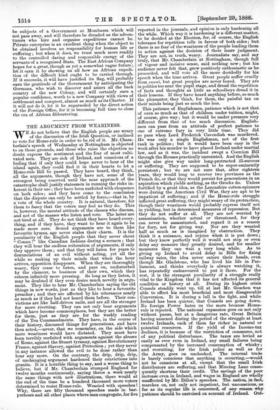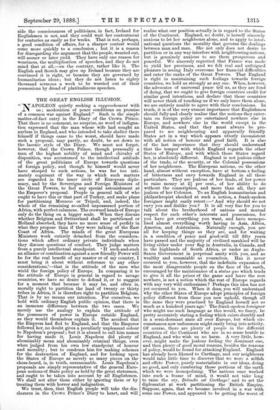THE ARGUMENT FROM WEARINESS.
WE do not believe that the English people are weary of the discussion of the Irish Question, or inclined to vote for Home-rule in order to be rid of it. Mr. Cham- berlain's speech of Wednesday at Nottingham is objected to on those grounds, and those who raise the objection no doubt express the sentiment and the fear of most culti- vated men. They are sick of Ireland, and conscious of a feeling that if only they could hope never to hear of the island again, they could find it in their hearts to let a Home-rule Bill- be passed. They have heard, they think, all the arguments, though they have not, some of the strongest being reserved until the near approach of the catastrophe shall justify statesmen in running the risks in- herent in their use ; they have been surfeited with eloquence on both sides ; and they have come to the conclusion that the dispute can only be settled by force,—that is, by a vote of the whole country. It is natural, therefore, for them to fancy that the voters may feel as they do. This is, however, the mental attitude of the classes who discuss, and not of the masses who listen and vote. The latter are not tired at all. They do not think they have heard every- thing, and if they have, they want to hear it again to be made more sure. Sound arguments are to them like favourite hymns, age never stales their charm. It is the peculiarity of the English people that they never shout Comm !" like Canadian Indians during a sermon ; that they will bear the endless reiteration of arguments, if only they approve them ; and that they will listen for years to denunciations of an evil without acting, yet all the while so making up their minds that when the hour arrives, opposition disappears. When they are thoroughly weary, they cease to listen, and pass on, undisturbed by the clamour, to business of their own, which they esteem infinitely more pressing. So long as they listen, it may be doubted if they even desire much novelty in argu- ment. They like to hear Mr. Chamberlain saying the old things in new words, just as they like to hear a favourite preacher ; and they are affected by his utterances nearly as much as if they had not heard them before. Their con- victions are like half-driven nails, and are all the stronger for more rivetting. They can not only bear arguments which have become commonplaces, but they are the better for them, just as they are for the weekly reading of the Ten Commandments. They have, in the course of their history, discussed things for generations, and have then acted,—never, that we remember, on the side which mere weariness would have dictated. They must have been terribly surfeited with arguments against the abuses of Rome, against the Stuart tyranny, against Revolutionary France. against Slavery, against Protection ; yet they never in any instance allowed the evil to be done rather than hear any more. On the contrary, the drip, drip, drip, of unchanging argument hardened their convictions into granite. It is a horrible thing to say, and a worse thing to believe, but if Mr. Chamberlain stumped England for twelve months continuously, saying thrice a week nearly the same things with new illustrations, there would at the end of the time be a hundred thousand more voters determined to resist Home-rule. Wearied with speeches ! Why, there are fifty thousand speeches made in bar- parlours and all other places where men congregate, for five reported in the journals, and opinion is only hardening all the while. Which way it is hardening is a different matter, to be decided at the Election, for, of course, the English tolerance for repetition tells in favour of both sides ; but there is no fear of the weariness of the people leading them to action against the decision of their inner judgment. They are. not, in truth, weary. Journalists say, and say truly, that Mr. Chamberlain at Nottingham, though full of vigour and incisive sense, said nothing new ; but his audience never felt that, grew positively enthusiastic as he proceeded, and will vote all the more decidedly for his speech when the time arrives. Great people suffer cruelly from ennui, but great peoples are never bored. They are in politics too near the pupil stage, and dread the repetition of facts and thoughts as little as schoolboys dread it in their lessons. If they have heard anything before, so much the pleasanter, they think, for them, the painful tax on their minds being just so much the less.
This patience of Englishmen, patience which is not that of oxen so much as that of children under tuition, might, of course, give way ; but it would be under pressure very different from that of too much discussion. English- men can pass from an attitude of perfect patience to one of extreme fury in very little time. They did so pass when Lord Frederick Cavendish was• murdered. He was only a single Englishman, not of the first rank in politics ; but it would have been easy in the week after his murder to have placed Ireland under martial law, and as it was, the incident swept a Coercion Bill through the Houses practically unresisted. And the English might also give way under long-protracted ill-success or suffering. They are supposed to be super-eminently persistent ; but we are not sure that, after eighteen years, they would long to recover two provinces as the French do, or that they would persist for generations in an aspiration which yields nothing, as the Greeks do. Unless fortified by a great idea, as the Lancashire cotton-spinners were during the American Civil War, they are apt to be impatient of suffering ; and if the Home-rule struggle inflicted great suffering, they might weary of its protraction, though their weariness would probably express itself not in yielding, but in determined measures of repression. But they do not suffer at all. They are not worried by assassination, whether actual or threatened, for they can never be assassinated, and regard it as a reason for fury, not for giving way. Nor are they wearied half as much as is imagined by obstruction. They think it a nuisance, and rejoice when it is put down ; but they know perfectly well it would not stop or even delay any measure they greatly desired, and for smaller measures they can wait a very long while. As to giving up Ireland to avoid delay in Bills for fixing railway rates, the idea never enters their heads, even though Mr. Gladstone, who has lived his life in Par- liament, and thinks everybody is always watching it, has repeatedly endeavoured to put it there. For the rest, it is the strangest peculiarity of a struggle really vital to the Kingdom that it has not affected its general condition or history at all. During its highest crisis Consols steadily went up, till at last Mr. Goschen was able to effect his most beneficial and most disagreeable Conversion. It is during a, lull in the fight, and while Ireland has been quieter, that Consols are going down. No foreign Power hates us the more because Home- rule is rejected. The national expansion goes on not only without pause, but at a dangerous rate, Great Britain having annexed during the period of the struggle at least twelve Irelands, each of them far richer in natural or potential resources. If the yield of the Income-tax declines, it is because- of the restriction of commerce, not of any political disturbance. The taxes are levied as easily as ever even in Ireland, any small failures being compensated by the increased consumption of whisky ; and recruiting, for the Irish police as well as for the Army, goes on unchecked. The internal trade is barely conscious that anything is occurring,—would not be conscious at all, except that the small Irish distributors are suffering, and that Mincing Lane conse- quently shortens their credit. The savings of the poor increase even in Ireland, and wages in England are wholly unaffected by Mr. Dillon's- speeches. The nation, in fact, marches on, not only not impatient, but unconscious, as far as its regular life is concerned, of any reason why patience should be exercised on account of Ireland. Out- side the consciousness of politicians, in fact, Ireland for Englishmen is not, and they could wait her contentment for centuries as easily as for weeks. That is not, perhaps, a good condition of affairs, for a sharper contest would come more quickly to a conclusion ; but it is a reason for disregarding the argument that the people, wearied out, will sooner or later yield. They have only one reason for weariness, the multiplication of speeches, and they do not mind that at all,—on the contrary, rather like it. The English and Scotch may give up Ireland because they are convinced it is right, or because they are governed by humanitarian ideas ; but they do not listen to eighty thousand sermons a week to be worried out of their possessions by dread of platitudinous speeches.







































 Previous page
Previous page